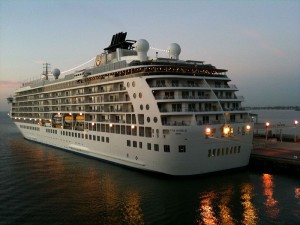Retirement on a Cruise Ship Combines Adventure with Convenience
Category: Travel
Nov. 30, 2010 — If you are the kind of person who likes adventure and convenience – two goals that are usually incompatible – retirement on a cruise ship might be for you. It’s easy to see why many folks like cruises – you arrive at the dock, have your picture taken and come on board for a glass of the bubbly. Meanwhile your luggage finds your room (tipping is usually already included). You stow your clothes away (once) and then contemplate which restaurant merits your dinner reservation. After a busy night at the shows or rolling the dice, you awake to find your new home arriving in a new and exotic port. You check out those sights, then back to the ship where you …. rinse and repeat! And until it’s time to go home,your job is to enjoy hassle-free travel from your moving base.
Many retirees go on cruises when they first retire. Usually they like them so much they keep on taking them, discovering new destinations with different cruise lines. The choices are many, from budget operators like Carnival and Voyages of Discover to mid-priced lines like Princess to the super-extravagant like Seabourn and Crystal. Your editor, who was anti-cruising before he went on one, has really enjoyed cruising on the smaller boat experience provided by Windstar and Princess lines. Photos below are from our Ocean Princess stateroom looking at Nice (France) and Sorrento (Italy) this September.


Some folks like it so much they decide to pretty much live on board, and we can’t blame them. Princess is just one cruise line that offers multi-month cruises. The Pacific Princess has a 97 night cruise around the world, while the Seven Seas Voyager (Regent) offers a 145 nighter. Here is a link to a dozen more “super-long cruises“.
But why stop there? Many folks actually take up residence on board a cruise ship built for long-term living. You typically own your apartment and pay your share of the communal expenses. On the more affordable end of that scale, you can read Jan Cullinane’s article about what it’s like to live on the Alegria, a cruise ship converted to permanent apartments.
But if you want to step up to the ultimate in permanent cruising, you might want to check out The World. Your Topretirements editor was fortunate enough to have enjoyed lunch and a tour on this beautiful ship when it recently visited Newport, RI. To say that it is luxurious would be a serious understatement. This boat is for the very wealthy, and my, what a life they can live. From the tennis court, resort pool, and mini-golf course on the top deck to the indoor swimming pool and dance floor on the rear deck – and everywhere in between – no possible luxury has been spared. The spa was the single most luxurious facility we have ever seen. There are at least 5 luxurious restaurants plus more casual dining options, and at least 2 are open at any time of day or night. Residents vote on each year’s itinerary and share management of the ship. They pay handsomely for the privilege, too. Apartments range from studios to multi-bedroom penthouses and range from about $600,000 to multi-million dollars. Monthly expenses start at about $20,000/month (but do include a dining allowance!). But, as was pointed out to us, compared to the cost of owning a yacht and cruising the world with your own captain and crew – The World is a bargain! Please enjoy the photos of the World below (large photo of the ship is courtesy of Wikipedia and VirtualSteve. See also Residential Cruise Liners.

What do you think? Would residential cruising be for you? Would you also have another base somewhere else. What happens when you become elderly. Share your thoughts in the Comments section below.
For further reading:
All Aboard: You Can Retire on a Ship













Comments on "Retirement on a Cruise Ship Combines Adventure with Convenience"
Genie says:
I've been told that long-term arrangements (other than Around the World cruises) can be made on almost any cruise line/ship. From what I understand, a couple can book a cabin for up to a year on the same ship for a significant price reduction off the weekly cost. I once read an article about a retired single lady who rented an inside cabin by the month for less than it cost her to live in her apartment, pay utilities, buy her food and pay the maintenance & payments on her car. The only drawback I can see is being limited to one or two itineraries for that ship. If, however, the ship spends part of the year in the Caribbean and then repositions to overseas or the west coast or Alaska for the remainder of the year, that could be a pretty awesome retirement option - for a couple years at least! :lol:
Jan Cullinane says:
Researchers Lee Lindquist and Robert Golub published an article in the Journal of the American Geriatrics Society, concluding that for people who needed some assistance with food preparation, house-cleaning, and access to medical care, it could be just as cost-effective, and provide a better quality of life, to live on a cruise ship as to live in an assisted-living facility.
Bon Voyage,
Jan Cullinane, co-author, The New Retirement: The Ultimate Guide to the Rest of Your Life (Rodale)
John Brady says:
I like these comments, which shed even more light about the cruising retirement life advantage. Here is another thing to think about. The inherent risk of buying into a residential ship is a lot like buying into a community with a home owners association that has many fixed costs. Running a ship is a big operation; fuel and crew expenses are huge. And if there are any unsold units or units in foreclosure or default, the rest of the units have to pick up the slack. So in these uncertain times renting (if you can) or as Genie says, signing on long term with a regular cruise ship eliminates all that risk. Good luck!
Maureen Brown says:
I first learned about the World residential ship on the Travel Channel and have dreamed of that lifestyle ever since. I am not wealthy, so finding out that there are options is so encouraging!:grin:
Wendy says:
This senior became "Bridge Director of the Seas".. Love it!
Who would ever think a fun hobby like bridge could turn into an even more fun job after retirement?
Dave Hughes says:
There have, in fact, been several people who live on cruise ships almost full-time for many years. While living on a cruise ship has some appeal, there are some significant drawbacks, too. For example, you can only do this if you're healthy. Medical care on a cruise ship is limited, expensive and not covered by most traditional insurance plans, so you'll need travel insurance. If you suffer a serious illness or injury, you'll quarantined in your room or hospitalized in the next port.
Then there's the social aspect. You'll meet a lot of new people every week, but they will all be temporary friends.
See http://wp.me/p3JYL4-gM for more.
Dave Hughes
RetireFabulously.com